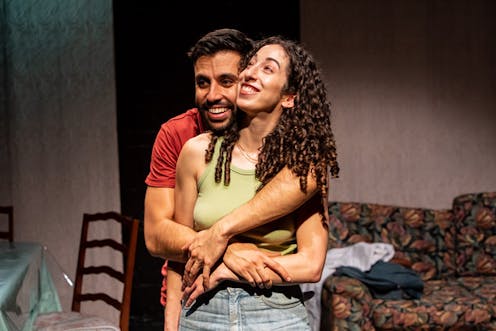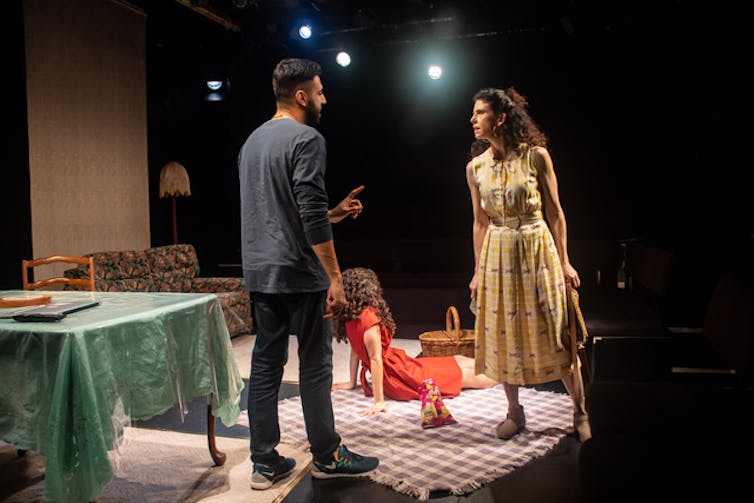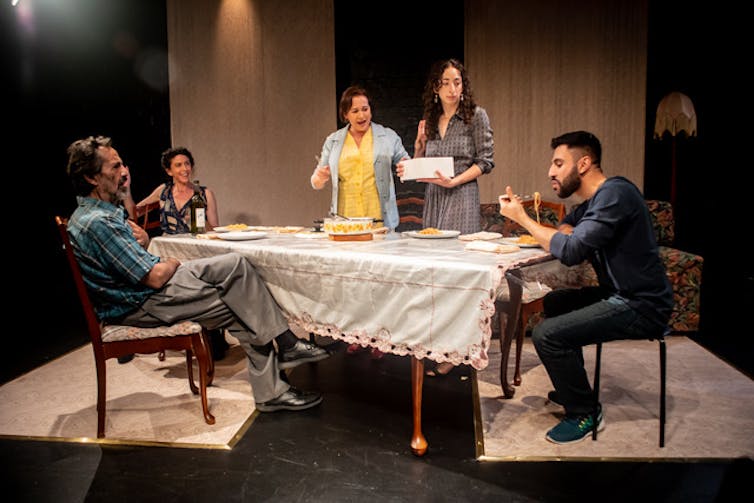
Review: Son of Byblos, directed by Anna Jahjah for Brave New World Theatre Company
The downstairs theatre at Belvoir might be small but the energy conjured from Son of Byblos is mighty. Written by James Elazzi and directed by Anna Jahjah, this small budget project shows how vital independent storytelling is in Australia today.
In another cross-cultural comic drama Elazzi presents the final part of a trio that included Omar and Dawn and Lady Tabouli, examining the forbidden territory of queer sexuality in a Lebanese-Australian cultural context.
A looming wedding creates a pressure cooker situation for queer cousins Adam (Mansoor Noor) and Claire (Kate Bookallil). Claire returns from Lebanon intent on marrying a guy she barely knows and who can’t speak English.
Adam tries desperately to convince her she is making a mistake, but Claire wants a family and to have kids. In her Lebanese family, she can’t if she’s a lesbian.

With his cousin turning “hetero” overnight, Adam feels abandoned. If Claire turns straight, he will be gay alone. His alienation from his family – and now Claire – has him unravelling
Adam briefly battles his way back to heterosexuality by reuniting with his ex, Angela (Violette Ayad). Angela tries to pretend that Adam isn’t gay. She is desperate to move out of home; marrying him is her only escape.
Adam, Claire and Angela have a desperate need for independence from the parental stranglehold. In their Lebanese families, heterosexual marriage is the way to freedom.
Read more: Lady Tabouli review: a hilarious comedy about suffocating expectations
Sexual freedoms
The intensity of these domestic scenes are momentarily paused when Adam has sex with anonymous men in public toilets. These scenes play out like fragments. Dispersed throughout the story they give Adam and the audience breathing space.
With the freedom of anonymous sex Adam literally and metaphorically steps off the family stage. He takes his hetero mask off and is able to be free.
These scenes have a conceptual importance, but director Anna Jahjah doesn’t quite make enough of these moments. We are given an Adam who is hiding with his boxer shorts like a scared cat in the dark.
The sex scenes nevertheless provide poetic pause where Adam can be himself. With men sucking his cock, Adam is rescued, but only briefly.
In a playful scene of sexual freedom, Claire dresses Adam in her red engagement dress (the dress she would have worn had she been allowed to get engaged to her ex-girlfriend Kate). The beauty of this scene is in Adam’s flirtatious and camp drag performance, at distinct odds with the anger and defensiveness he displays around his father John (Simon Elrahi).
Stories of art
Elazzi demonstrates a nuanced and powerful understanding of Lebanese family life.
Carol (Deborah Galanos), Adam’s mother over salts the meals. She tries to stand up to her husband’s patriarchal rule by taking up tango. Adam fails in his attempt to core koosa (zucchini).
His father is obsessed with him being an engineer (because he thinks engineering makes money and web design doesn’t). The plastic-covered tablecloth is frantically changed when Angela, the guest, arrives unannounced at dinner.

The simple fact that these details are played out on an Australian theatre stage is significant. The woman sitting next to me turned and said: “so amazing and so unusual to hear our stories come to life like this.”
For Lebanese-Australians, there are few stories that play out in the public sphere. They are not the stories of art. The stereotypical narrative of crime, terror, war and abuse continue as dominant narratives.
Read more: From 'Leb bread' to 'Leb Kelly', finally we're seeing more Middle Eastern faces on TV
Despite the rhetoric of inclusivity, artists of Lebanese heritage face personal and political obstacles. Professionally, it is difficult to find a place in Australian radio, theatre and television for stories that aren’t Anglo-Australian or dumbed-down multicultural stereotypes.
On the home front, there are the challenges of persuading family and the Lebanese community that creativity is valuable, not to mention the need to be oneself if that self is queer.
Elazzi must be tough. He is a rare artist in Australian theatre prepared to take risks to write different stories that make us think and more importantly make us laugh.
Son of Byblos is at Belvoir Downstairs until May 21.
Cherine Fahd does not work for, consult, own shares in or receive funding from any company or organisation that would benefit from this article, and has disclosed no relevant affiliations beyond their academic appointment.
This article was originally published on The Conversation. Read the original article.







